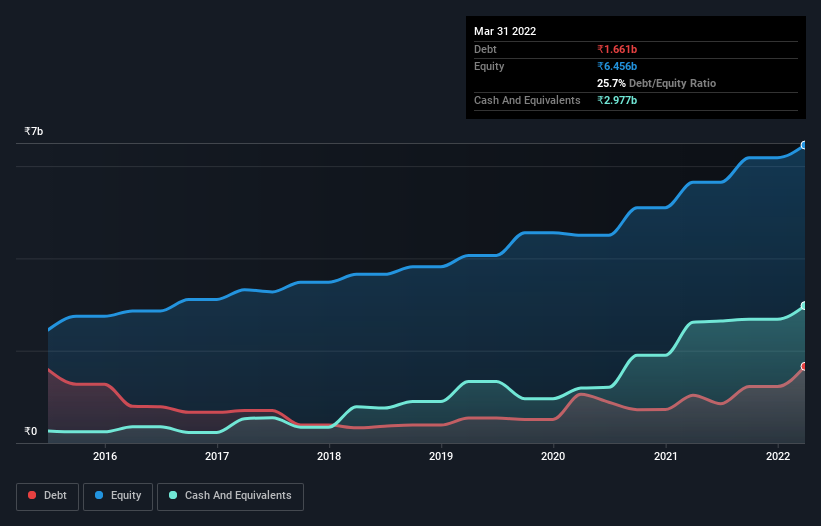Howard Marks put it nicely when he said that, rather than worrying about share price volatility, 'The possibility of permanent loss is the risk I worry about... and every practical investor I know worries about.' So it seems the smart money knows that debt - which is usually involved in bankruptcies - is a very important factor, when you assess how risky a company is. As with many other companies Deccan Cements Limited (NSE:DECCANCE) makes use of debt. But the more important question is: how much risk is that debt creating?
Why Does Debt Bring Risk?
Debt and other liabilities become risky for a business when it cannot easily fulfill those obligations, either with free cash flow or by raising capital at an attractive price. In the worst case scenario, a company can go bankrupt if it cannot pay its creditors. However, a more usual (but still expensive) situation is where a company must dilute shareholders at a cheap share price simply to get debt under control. Having said that, the most common situation is where a company manages its debt reasonably well - and to its own advantage. When we think about a company's use of debt, we first look at cash and debt together.
View our latest analysis for Deccan Cements
How Much Debt Does Deccan Cements Carry?
The image below, which you can click on for greater detail, shows that at March 2022 Deccan Cements had debt of ₹1.66b, up from ₹1.04b in one year. However, its balance sheet shows it holds ₹2.98b in cash, so it actually has ₹1.32b net cash.

How Healthy Is Deccan Cements' Balance Sheet?
We can see from the most recent balance sheet that Deccan Cements had liabilities of ₹2.36b falling due within a year, and liabilities of ₹1.04b due beyond that. Offsetting these obligations, it had cash of ₹2.98b as well as receivables valued at ₹283.6m due within 12 months. So its liabilities outweigh the sum of its cash and (near-term) receivables by ₹133.9m.
Since publicly traded Deccan Cements shares are worth a total of ₹6.38b, it seems unlikely that this level of liabilities would be a major threat. Having said that, it's clear that we should continue to monitor its balance sheet, lest it change for the worse. Despite its noteworthy liabilities, Deccan Cements boasts net cash, so it's fair to say it does not have a heavy debt load!
But the other side of the story is that Deccan Cements saw its EBIT decline by 4.7% over the last year. If earnings continue to decline at that rate the company may have increasing difficulty managing its debt load. There's no doubt that we learn most about debt from the balance sheet. But you can't view debt in total isolation; since Deccan Cements will need earnings to service that debt. So when considering debt, it's definitely worth looking at the earnings trend. Click here for an interactive snapshot.
Finally, while the tax-man may adore accounting profits, lenders only accept cold hard cash. While Deccan Cements has net cash on its balance sheet, it's still worth taking a look at its ability to convert earnings before interest and tax (EBIT) to free cash flow, to help us understand how quickly it is building (or eroding) that cash balance. Over the last three years, Deccan Cements reported free cash flow worth 5.8% of its EBIT, which is really quite low. For us, cash conversion that low sparks a little paranoia about is ability to extinguish debt.
Summing up
While it is always sensible to look at a company's total liabilities, it is very reassuring that Deccan Cements has ₹1.32b in net cash. So we are not troubled with Deccan Cements's debt use. There's no doubt that we learn most about debt from the balance sheet. But ultimately, every company can contain risks that exist outside of the balance sheet. To that end, you should learn about the 4 warning signs we've spotted with Deccan Cements (including 1 which can't be ignored) .
When all is said and done, sometimes its easier to focus on companies that don't even need debt. Readers can access a list of growth stocks with zero net debt 100% free, right now.
New: Manage All Your Stock Portfolios in One Place
We've created the ultimate portfolio companion for stock investors, and it's free.
• Connect an unlimited number of Portfolios and see your total in one currency
• Be alerted to new Warning Signs or Risks via email or mobile
• Track the Fair Value of your stocks
Have feedback on this article? Concerned about the content? Get in touch with us directly. Alternatively, email editorial-team (at) simplywallst.com.
This article by Simply Wall St is general in nature. We provide commentary based on historical data and analyst forecasts only using an unbiased methodology and our articles are not intended to be financial advice. It does not constitute a recommendation to buy or sell any stock, and does not take account of your objectives, or your financial situation. We aim to bring you long-term focused analysis driven by fundamental data. Note that our analysis may not factor in the latest price-sensitive company announcements or qualitative material. Simply Wall St has no position in any stocks mentioned.
About NSEI:DECCANCE
Proven track record with imperfect balance sheet.
Similar Companies
Market Insights
Community Narratives



